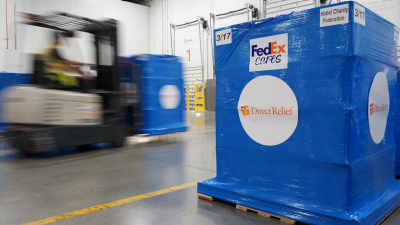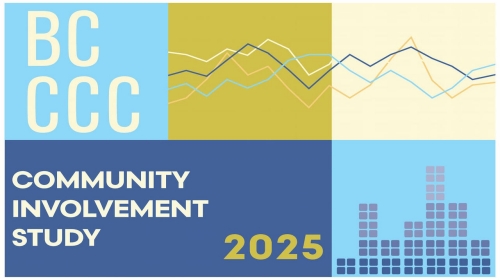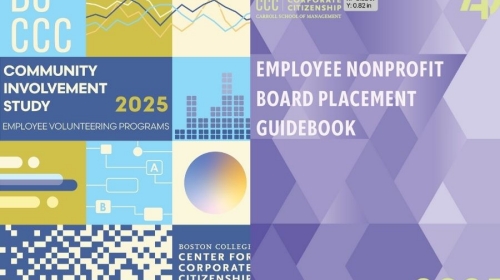WEBINAR: This webinar explores how to measure and communicate your organization's social impact with proven frameworks and strategies that matter to stakeholders.
The Corporate Citizenship Imperative During Crisis

This is an excerpt from Issue 32 of the Corporate Citizen: Exploring New Perspectives.
Since the COVID-19 outbreak began in early January 2020, organizations have stepped up to support first responders and health professionals, remove barriers to health care, and provide products and services to employees, customers, and others who need them most. Among them on the frontlines, FedEx has responded to the call for social responsibility in the time of need.
FedEx is using its strongest capabilities to meet critical demands during the crisis—its logistics network and expertise. With more than 650 aircraft, 180,000 trucks, and 475,000 team members spanning 220 countries and territories, FedEx is well-positioned to be a leader in addressing the global scope of the pandemic. In fact, supporting the relief and recovery efforts related to COVID-19 makes sense given FedEx’s overarching strategy: connect people with goods, services, ideas, and technologies in order to create opportunities that fuel innovation, energize businesses, and empower communities. While the events related to the pandemic are still unfolding, FedEx’s swift actions thus far serve as a case study for companies seeking to think beyond bottom lines and good causes, and more about how to leverage core operations and business strengths to truly deliver impact globally.
Stepping Up from the Start
More than 220 FedEx flights operate out of five Chinese airports every week, which is why FedEx was one of the first to offer aid in the epicenter of the COVID-19 outbreak in Wuhan, China. In early 2020, the company rapidly mobilized its transportation and logistics abilities to ship and deliver essential equipment and supplies to China’s health care organizations through its FedEx Cares global community engagement program.
Working with the nonprofit humanitarian organization Direct Relief—a longtime FedEx charitable partner—FedEx shipped more than 200,000 surgical masks and protective equipment, such as gowns and gloves, to Wuhan Union Hospital to aid medical professionals on the ground. This collaboration was an extension of the company’s “Delivering for Good” initiative, in which FedEx provides resources and support to organizations in times of crisis through in-kind shipping and charitable cash donations.
“FedEx is proud to mobilize its global network to deliver aid, comfort, and care to people suffering in the wake of this unprecedented health emergency,” said FedEx President and COO Raj Subramaniam at the time of the delivery. “We will continue to work closely with humanitarian and disaster relief organizations to provide support and deliver supplies, doing what we do best to help those who need it most.”
The company followed up on that commitment in the ensuing weeks with several additional shipments of medical supplies to major hospitals in the Wuhan area—working closely with Guangzhou Baiyun Airport Customs as well as the China Post—to move shipments swiftly through clearance to the front lines.
It is through cross-sector collaborations such as these that companies can achieve the scale required to address sprawling global challenges such as this one. To date, FedEx has shipped millions of mission-critical masks, gowns, face shields, shoe covers, surgical caps, and coveralls among other community needs.
Protecting and Supporting Team Members
With many Americans working from home, avoiding public places, and increasing online shopping, FedEx continues to operate as an essential business. From the corporate office to its global hubs, the company is keeping the safety and well-being of its team members atop priority and continues to take the necessary steps to protect them and its customers.
As COVID-19 has become more widespread, the Centers for Disease Control and Prevention, World Health Organization (WHO), and state governments have implemented increasingly stricter guidelines to slow the spread of the virus. To protect its team members, FedEx supplied them with surgical masks, gloves, hand sanitizer, and alcohol wipes and regularly disinfects facilities. FedEx is also educating team members with ongoing communications about COVID-19 and taking any signs of illness seriously, reinforcing the practice of washing hands frequently, and urging team members to seek proper medical attention if they develop symptoms.
President and COO Subramaniam expressed the company’s appreciation for employees performing crucial operations. “Our team members are moving commerce and other critical supplies around the globe,” Subramaniam said. “The work they do is an essential service, and we are grateful. It is in times of crisis that they truly step up and show the world who we are and what we do.”
FedEx has adapted in real time to make additional operational changes to safeguard health and safety while it continues normal business operations in an abnormal time including suspending signature requirements for most deliveries and enforcing social distancing measures at security screening, on employee shuttles, and in common areas.
Continuing the Fight on the Homefront
The epicenter of the virus has since shifted to the U.S. homefront as states prepare and deal with a surge of COVID-19 patients. In a continuation of humanitarian efforts abroad, FedEx has played its part in the U.S. by helping hospitals deal with the crisis, supporting school districts in feeding displaced students, and expediting the testing so desperately needed across the country.
In one standout effort, FedEx Express stood up a special operation to help the U.S. government move COVID-19 test specimens from more than 50 remote drive-through testing centers at major retailers across 12 states. This collaborative effort—coordinated among retailers, health care companies, the White House, the Department of Health and Human Services (HHS), and the Federal Emergency Management Agency (FEMA)— enabled rapid processing of test specimens to help prevent the spread of the virus. Once again, FedEx used its core logistics capabilities, resources, and expertise to play a critical role in the effort. FedEx Express dedicated 28 flight legs to the delivery, using its patented SenseAware® technology and monitoring to help transport the test specimens safely. FedEx Express has continued to provide daily support as more remote testing centers become available across the country. To date, the company has shipped more than 1 million COVID-19 test kits domestically in partnership with several government agencies.
This effort is one among many in which FedEx has worked proactively with governments, nonprofits, suppliers, and retail customers to use its core capabilities to advance COVID-19 relief efforts. In collaboration with International Medical Corps, FedEx has helped deliver additional mobile health facilities to Los Angeles County that help hospitals manage patient flow, triage, and treatment. And, in its global headquarters city of Memphis, Tenn., FedEx used temperature-controlled trucks to help deliver bagged lunches for more than 120,000 Shelby County School District students now displaced from classrooms.
FedEx has mobilized efforts to support communities around the globe in a rapidly changing situation. In Subramaniam’s words, “We have a great responsibility in these unprecedented times to do what we do best—mobilize our network quickly to help the communities where we live and work.”
The new decade has undoubtedly presented a natural opportunity for companies to reflect on current efforts, plan for future progress, and consider what our global impact is and what we would like it to be for decades to come. But, as FedEx has proven, we are at our most effective when corporate citizenship work supports business objectives and delivers social impact around the world.
Read more in Issue 32 of the Corporate Citizen: Exploring New Perspectives.
Related Content
RESEARCH BRIEF - Researchers investigated how ESG activities help or hurt financial performance, using nine years of data from over 1,200 global companies.
RESEARCH BRIEF - Researchers analyzed 4 US energy exchange-traded funds (ETFs) over 15 years, including 2 dirty energy funds tracking fossil fuel companies and 2 clean energy funds tracking renewable energy companies.
RESEARCH BRIEF - Researchers conducted a survey, which measured perceptions of CSR and ethical leadership within the manufacturing and service industries.
WEBINAR: This webinar explores how corporate giving will be reshaped by the One Big Beautiful Bill. Hear directly from corporate citizenship leaders as they share innovative, real-world strategies that deliver impact for communities and results for business.
This study explores shifting trends in employee volunteering, corporate giving, and other means of corporate community involvement.
This guidebook offers insights on placing employees in nonprofit board service roles.
This study explores shifting trends in employee volunteering, corporate giving, and other means of corporate community involvement.








